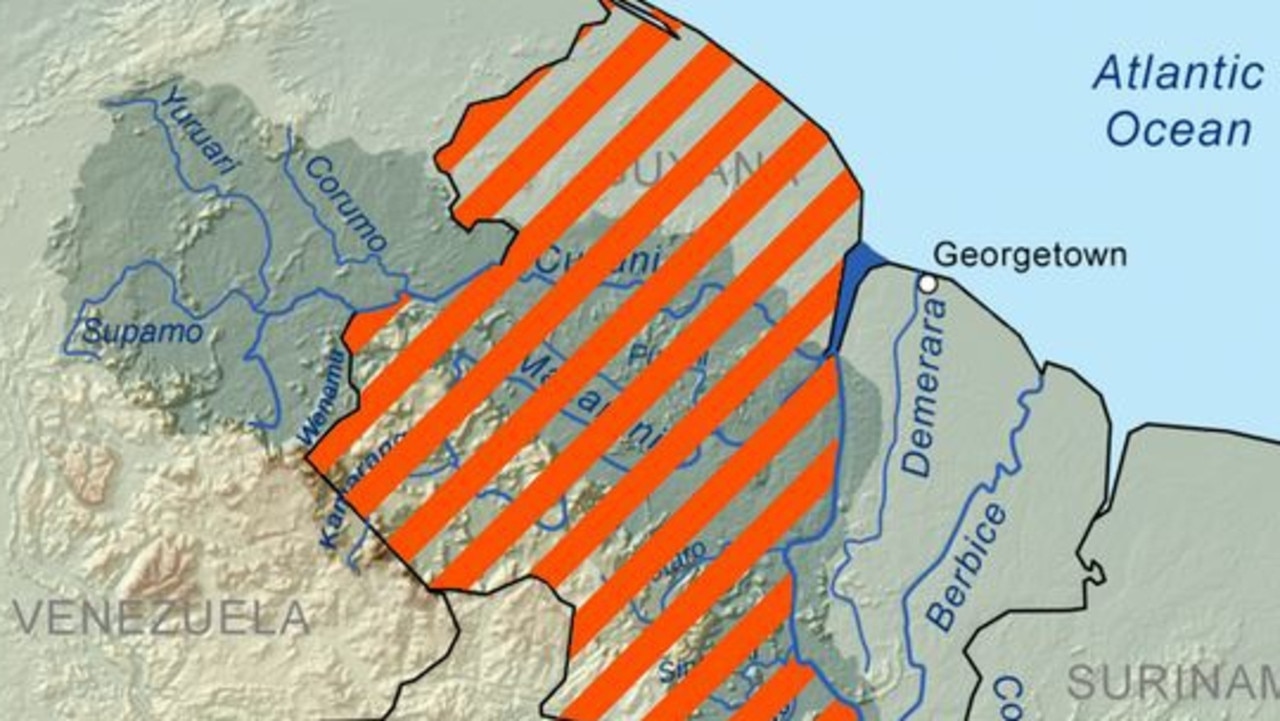[ad_1] A new flashpoint for international conflict is brewing after a Latin American government declared an overwhelming victory in a referendum tha
[ad_1]
A new flashpoint for international conflict is brewing after a Latin American government declared an overwhelming victory in a referendum that asked voters if it should be able to annex two thirds of a neighbouring oil rich country, “by all means”.
Venezuela, a near dictatorship with close links to Russia and China, said 95 per cent of voters backed the territorial claim to the Essequibo region of Guyana.
On the streets of Caracas people were seen holding flags with an adjusted map of Venezuela which included the region in Guyana.
There are fears Venezuela’s President Nicholas Maduro, who has been in power for a decade and has trampled democracy, could follow a Russian playbook of using disputed referendums, elections and misinformation to attempt to justify military action.
Venezuela has long claimed the Essequibo region but its rhetoric has increased since oil was found there which some have said could turn Guyana, one of the poorest states on the continent, into South America version of the rich United Arab Emirates.
Guyana is the only English speaking nation in Latin America. Its population, of not even one million, pales against Venezuela’s 28 million.
Last week, Brazil said it had beefed up the military presence on its northern border with Venezuela close to Guyana.
While Venezuela hasn’t said what action, if any, may result from the referendum, Guyana’s foreign minister, Hugh Todd, told The Guardian that people in Essequibo were “very concerned”.
“Maduro is a despotic leader, and despotic leaders are very hard to predict.”
For his part, Mr Maduro hailed the referendum result as “a total success for our country, for our democracy”.
One of the five questions asked in the referendum was if Venezuelans agreed “to reject by all means, in accordance with the law” an 1899 ruling that placed Essequibo within the territory of what is now Guyana. Like the other questions, those who voted. voted Yes.
Mr Maduro added there was a “very important level of participation”.
However, observers have said there were no queues outside polling places in the capital city of Caracas, which is typical for votes.
Electoral authorities said 10.5 million votes were counted in the referendum. However it didn’t specify if that represented 10.5 million individual voters or if it was the total amount of votes across all five questions.
If the latter was the case then only around 2 million Venezuelans voted – a poor turnout.
Dispute has lasted two centuries
The Essequibo region is thickly forested and lightly populated with only around 15 per cent of Guyana’s 800,000 residents.
The territorial dispute goes back more than two centuries with Venezuela, then freshly independent from Spain, first staking a claim in 1811.
The 1899 legally binding international ruling placed the area under the control of British Guinea which became the independent nation of Guyana in 1966.
Venezuela recognised this ruling until the 1960s and even after that the dispute largely fell under the radar for decades – until Guyana’s oil discoveries
US oil giant ExxonMobil together with China’s CNOOC believe more than 11 million barrels of oil and gas could lie off the Essequibo coast. It’s an amount that could transform Guyana’s economy.
That is very little oil compared to Venezuela itself which has reserves of around 300 billion barrels. But it would be a boost to its economy – and more oil could be found.
On Friday, the International Court of Justice told Venezuela to “refrain from taking any action” that would change the status quo in Essequibo.
But Mr Maduro’s has become increasingly vociferous about Venezuela’s claims to the Guyana territory.
His TikTok account, which has more than 2 million followers, is full of content proclaiming Essequibo to be Venezuelan.
Theoretically, Guyana would be a pushover for Venezuela which has a far larger and more modern military.
However, it wouldn’t be straightforward. The dense jungle of Essequibo would make any land advance extremely difficult.
The only road crossing between the two nations goes through a corner of Brazil.
Brazil’s public pronouncement that it was strengthening its border with Venezuela was likely designed to deter Caracas from even toying with the thought of an invasion via that road.
Military action by sea would also be treacherous and might be frowned upon by China with its oil interests already established in Guyana.
Bluster ahead of election
Some believe the referendum and whipping up of nationalism is bluster by Mr Maduro ahead of next year’s presidential elections.
“Conveniently, Venezuela’s plans for the Essequibo focus the electorate’s nationalism at a time when Venezuela’s dire economic, humanitarian, and security crises worsen,” Latin American expert at the Council on Foreign Relations Paul J Angelo, wrote last year in Foreign Policy magazine.
‘Alarming’
However, others are worried that the more Mr Maduro stokes up geopolitical tensions with his neighbour, the harder it will be for him to walk away from embarking on military action.
“It is very alarming. We are probably heading to a dead-end street where both sides have to protect their honour, and that is a dangerous place where, throughout history, irrational decisions have been taken,” Venezuela military expert Rocío San Miguel said.
Venezuela is building an air base close to the border. While in recent days, Guyana’s President Irfaan Ali visited the border and raised the Guyanan flag close to Venezuela.
“The people who reside in that region speak English, they pay taxes to the government of Guyana, they abide by our constitution … and they call themselves Guyanese. So it has nothing to do with Venezuela,” Guyana’s foreign minister, Hugh Todd said.
[ad_2]
Source link



COMMENTS